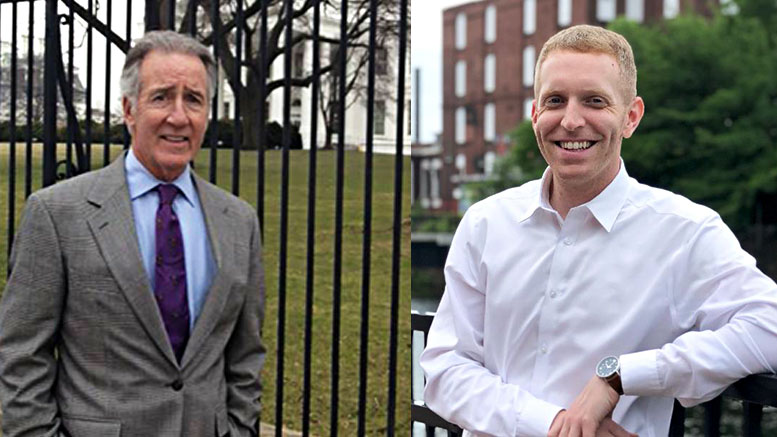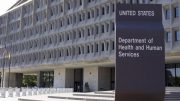Holyoke Mayor Alex Morse says he’s challenging “status quo” by running against Congressman Richard Neal
By: Mike Givens/TRT Assistant Editor—
Holyoke, Massachusetts Mayor Alex Morse has challenged incumbent Representative Richard Neal for the congressional seat representing western Massachusetts.
Morse, citing his opinion that Neal has become ineffective in his current role, claims that the congressman’s tenure has been too focused on insider politics and power-grabbing in Washington D.C. rather than serving the constituents of western Massachusetts.
“When you listen to people talk about their daily struggles and challenges, it’s been very hard for people to make a connection between a powerful member of Congress and how that’s made a difference in their lives or in their neighborhoods or in the communities,” Morse said of Neal’s leadership. “I want to be a member of Congress that is less concerned about building seniority and years in office and being more concerned with whether I am making a difference on the ground in peoples’ lives.”
In response to Morse’s attacks, Neal countered with his contention that his tenure is what’s necessary to effectively move the nation forward.
“Seniority, experience, and knowledge of the legislative process are all critical in order to deliver for [the] district,” Neal said in an e-mail interview with The Rainbow Times. “An experienced and knowledgeable legislator is crucial to craft, advocate, and pass policies that help people in this district and across the country.
“For example, I helped write the Affordable Care Act. I’m authoring legislation that will save pensions for millions of our brothers and sisters in organized labor, lower prescription drug costs and so much more that will bring about economic relief for working and middle-class families. It was because of my experience and knowledge that I was able to deliver millions of dollars to turn Springfield’s Union Station into a state-of-the-art regional transit hub, bring in $12 million in fire grants to make our communities safer, and secured over $40 million in the House budget for infrastructure updates at Westover Air Force Base.”
Reviving the American Dream
Located in the western half of Massachusetts, the 1st Congressional District encompasses 87 cities and towns and touches five counties. As of the 2010 census, the district has a population of more than 700,000.
Born in Worcester and raised in Springfield, Neal, 70, began his political career in 1972 when he staffed the gubernatorial campaign of George McGovern. In 1988, he successfully ran to be the state representative of the 2nd Congressional District of Massachusetts, which largely comprised central Massachusetts.
In 2012, the 1st and 2nd districts of Massachusetts were altered to reflect the results of the 2010 census. Neal would serve 12 terms as the representative of the 2nd District from 1988 to 2012. After the redistricting process in 2012, he ran for the new 1st Congressional District, which encompasses all of western Massachusetts. He is currently in his fourth term representing the district.
“After my parents passed away, my sisters and I were raised by an aunt and a grandmother on Social Security Survivor Benefits,” Neal said of his background. “My family was able to stay together because of the life-changing programs authored by Franklin Roosevelt. I’ve never forgotten where I came from, and that’s why [voters] will not find a stronger advocate than me anywhere in this country for our bedrock Democratic principles.”
During his tenure, Neal has achieved a number of accomplishments for western Massachusetts, including infrastructure improvements, tax credits, and investments in police and fire departments, all across the district’s cities and towns.
Nicole LaChapelle, mayor of Easthampton, Mass. and a supporter of Neal, described the congressman as an “activist” and said he’s always been a strong resource for her while she’s served as mayor, and even before that when she worked in the education field.
“He’s never really forgotten where he’s come from … and never shied away from continuing to work on those really tough inner-city issues in western Massachusetts,” said LaChapelle, who is from Holyoke. “The results aren’t always sexy, they’re certainly not within 18 months or a two-year term, but he’s always pushed the needle forward.”
During 2019, Neal said he is working on a range of issues, from providing pathways to universal healthcare coverage to addressing the economic and health consequences of climate change to preserving Social Security and Medicare.
“What we have done in the last few months is just scratching the surface of where we are going under Democratic leadership,” he said. “But we can only move forward by keeping the House, winning the Senate, and defeating Donald Trump in 2020.
“As the Chairman of the Ways & Means Committee, my priority is to revive the American Dream: the opportunity for a good job, to save for a secure retirement, to send the kids to college, and to leave the community a better place for the next generation. For me, it all comes down to priorities. I want to invest in the great people of western and central Massachusetts who work hard each and every day with the simple goal of making life just a little bit easier for themselves and the next generation.”
Moving the Needle, Changing Outcomes
At the age of 22, Morse was elected to be Holyoke’s youngest mayor in November 2011. Morse, 30, serves as the first openly-gay mayor of Holyoke and has won reelection three times.
“I’ve been mayor for about eight years now and I ran because many people had resigned themselves to the fact that Holyoke’s best days were behind us and there were people and places, neighborhoods, certain communities that lost faith that local government could be a force for good in their lives,” Morse said in an interview with The Rainbow Times about his inspiration for running.
Reflecting on his four terms in office, Morse has said that he’s accomplished a lot for the city [Holyoke].
From investments in the city’s computing center and downtown area to building more affordable housing, and infrastructure improvements, Morse said the last eight years have brought about a key transformation for the city.
“I always say I wanna make Holyoke a city again, that means a place where people can live, be safe, grab a bite to eat, spend time with friends or family,” he said.
According to Morse, his greatest accomplishment has been building a strong relationship between the city government and the town’s more than 40,000 residents.
“We’ve opened up the doors of City Hall to everyone and to communities that have traditionally felt excluded, particularly communities of color,” he said.
Part of making City Hall more accessible, according to Morse, was prioritizing diversity. He set about making sure that more positions in City Hall were filled with women, Latinx people, young people, and city residents with lower incomes.
The mayor said his diversity efforts were intrinsic to, “acknowledging our city’s history—much like our country’s history—of racism and segregation and disparities in opportunities, and doing our part over the last eight years to be intentional about closing those gaps in the city. And yes, we still have challenges and we still have a ways to go, but we are certainly heading in a positive direction.”
Holyoke resident Jeffery Anderson-Burgos, a friend of Morse and supporter of his campaign, said that the mayor has done a lot to bring communities together and empower residents to be leaders.
“What I’ve seen him do is get people engaged,” he said. “Both by his example and by encouraging others, we live in a city where people feel like they have a role to play in making the city a better place to live. That often will lead to disagreements over the right path, as it should, but I see a lot of different opportunities for residents to be engaged and they do seek it out.
Morse went on to discuss the investments the city has made in public parks and spaces, turning former mills into co-working spaces, artist studios, restaurants, galleries, and cannabis cultivation facilities.
With regards to education, Morse said that just a little less than half of High School students were graduating, but under his leadership close to 72 percent of students are now getting their diplomas. He said he’s proud that he’s pushed the education system closer to universal pre-kindergarten for young children and encouraged dual-language programs that allow students to learn both English and Spanish.
In 2015, the Holyoke Public School system was suffering from a significant amount of dropouts, low graduation rates, and generally poor academic performance. A decision was made in the spring of that year to have the state of Massachusetts take over administration of the school district to address its chronic issues, also known as receivership. In the more than four years the state has been under receivership, improvements have been made throughout the district.
Aware of tensions between communities of color, low-income residents and the police, Morse said that he prioritized public safety to, “make sure people see the police department not as an adversary, but a partner in keeping the neighborhoods safe.”
In that spirit, he supported community policing efforts and programs that helped build relationships between the police and Holyoke residents. Morse claims that crime has been reduced by 40 percent since he’s taken office.
“The reason I ran [for mayor] was to make sure everyone has a seat at the table, that everyone felt welcome in the mayor’s office, that they felt like city government is there for them,” he said, noting that he feels that public perception of the city has improved. “I feel very proud of the fact that we’ve lived up to that commitment and goal.”
With a population of about 1,700 people and about 50 minutes north of Holyoke, Shelburne Falls is a small village in the towns of Shelburne and Buckland, Mass. and home to Amy Peterson, a therapist. Peterson has expressed her support for Morse in the race and applauds his leadership.
“Alex Morse grew up working class and it seems clear that his life experiences have shaped his values and his leadership style in positive ways,” she said in an e-mail interview with The Rainbow Times. “When I met Alex Morse, I was impressed by his calm, down-to-earth nature and quiet intelligence. I also observed his genuine interest in the lives of families and kids in western Massachusetts.”
Peterson said that she’s supporting Morse because of his progressive platform and his desire to support the rural communities that make up the western part of the state.
When it comes to running for Congress, Morse didn’t mince words about his opinion of Neal’s leadership over the last 30 years.
“I think there’s an urgency to this moment in this country and this urgency isn’t matched by our representative in Congress,” he said frankly. “After spending 30 years in Congress, I think Richard Neal has become more interested in preserving the status quo than moving the needle and changing outcomes here in western Massachusetts.
“When you look at outcomes and challenges present here in Western Mass., you would never know we have one of the most powerful Democrats in Congress representing us.”
Anderson-Burgos agreed with Morse’s sentiment.
“In contrast to Alex, I find Congressman Neal too measured and afraid to be disruptive,” he said. “We’re in a place where our government is caging children, pulling back from allies, embracing autocrats, and pretending climate change isn’t an issue.
“Statements of disappointment aren’t good enough. I want our members of Congress to be forceful in word and indeed, and I’m not seeing it. He needs to be angry, not disappointed. In a couple of words, I’d characterize his representation as stale and absent. I honor his service over the years, but it’s time for him to move on.”
When asked about the potential to make changes, Morse was confident that, if elected, his leadership would be transformative.
“I can only do so much as mayor to move the needle unless we have a strong federal partner that understands the problems and the challenges of the people on the ground and has a real interest in using the power of the congressional seat to actually help peoples’ lives.”
Though often lauded for his leadership, Neal has often been criticized for his lack of public comment on high-profile issues such as the Green New Deal and impeaching President Trump, which Morse has readily noted in his criticism of the representative.
What Can Voters Expect?
Though the mayor of a city of 40,000 people, Morse said that he has a deep understanding of how the residents of western Massachusetts are treated.
“I think there are people and places, cities, and towns, that feel forgotten about, left behind, and don’t see government as a means to improve their everyday lives,” he observed.
When speaking with The Rainbow Times about his candidacy, Morse listed three top areas that he’d focus on, if elected.
“One of the issues I hear most from people here in western Massachusetts is the lack of access to quality affordable health care,” he said. “People are literally dying because they don’t have health insurance or are underinsured.”
Morse said that he often hears stories of the high costs of co-payments, premiums, and deductibles, all of which contribute to a cycle of poverty and deprivation for those living in western Massachusetts.
“We have a member of Congress that, again, has pushed to maintain the status quo,” he said of Neal. “A healthcare system that puts pharmaceutical companies and their profits before people and their public health.”
Morse said he will advocate for a universal Medicare system where healthcare coverage is affordable for all.
Peterson agreed with Morse, stating that she believes Neal is, “beholden to fossil fuels and health insurance companies, rather than the people he represents.”
Morse also spoke about climate change.
“Often people think that climate change is something that is far away and we’ve seen here in Holyoke with over 2,000 Puerto Ricans migrating from the island after Hurricane Maria and making sure that communities like Holyoke, Springfield, and other communities are prepared for that migration,” he said of the 2017 category five hurricane that took the lives of more than 3,000 people in the U.S. Virgin Islands, Dominica, and Puerto Rico, displaced thousands, and cost more than $90 billion. “There will be more climate disasters around the world.”
Morse also voiced support for the Green New Deal, a bill that, if passed, would seek to address the impact of climate change by decreasing the United States’ dependence on fossil fuels while encouraging the use of more environmentally-friendly products. The bill would also stimulate economic growth by providing more jobs to middle and lower-income families and prioritizing investments in infrastructure.
Taking another jab at Neal, Morse said this third priority would be to crack down on corporate donations to politicians.
“The Congressman takes millions of dollars from corporations and corporate political action committees (PACs) and special interests and I pledge to not take a single dime from any corporation or corporate PAC,” he said. “[This] means I’m only taking donations from real people, everyday people, grassroots donations. People here in Western Massachusetts and across the state.”
Morse emphasized his belief that politicians have become indebted to wealthy donors and corporate PACs, a relationship he says that he never wants to have. He claimed that he only wants to be beholden to, “the people of western Massachusetts.”
When asked about Morse’s stance on corporate donations, Anderson-Burgos said the decision is welcome and, “makes a clear statement about what and who Alex values.”
LaChapelle agreed with Morse’s contention but countered that Neal is operating within a system that has already been in place for years.
“Money in politics is very complicated and it darkens the process of democracy and transparency,” she said. “I don’t think that Congressman Neal would argue against that argument, however, that is how it is working right now until we pass something like Citizens United.”
LaChapelle noted that Neal has been able to parlay corporate donations into investments in public projects.
“I also would like to hear another side of the argument looking at Congressman Neal’s ability to raise [monies] and how it’s helped us regain the House as Democrats, it will be a part of us maintaining that majority,” she said of Neal. “His work for Social Security, Medicare, the Affordable Care Act, and money back into fire and police, public departments, not privatization, goes contrary to the argument that corporations own him.
“I’m so proud that my hometown is represented by such a progressive, wise-thinking mayor,” she said. “However, when we have a problem with one candidate’s money, I do think Alex needs to take a look at his sit-downs with Tom Steyer, who’s a billionaire.”
Steyer, a Democratic presidential candidate who lives in San Francisco and is estimated to be worth over a billion dollars, is a progressive philanthropist and hedge fund manager.
“Earlier this year a billionaire from California dumped hundreds of thousands of dollars of dark money into this district to try and influence my decisions—at the same time that billionaire had a private meeting with Mayor Morse,” said Neal of a campaign Steyer launched earlier this year to pressure the congressman into pursuing impeachment proceedings against President Trump. “Voters in this district know I am responsive to them, not dark money billionaires.”
A representative from Morse’s campaign confirmed that the mayor met once with Steyer earlier this year and said the two have never spoken again and Morse has not accepted any political donations from Steyer.
If re-elected, Neal committed to fighting Trump’s policies and undoing the damage he says the president has done, but also ensuring economic equality and a representative Congress.
“Important as it is to fight back against Donald Trump, our success in 2020 will be because Democrats have better ideas and vision to help level the playing field for working families,” he said. “Because of the work of Democrats across the country in 2018, we flipped 40 seats and took back the House. I am proud to have helped recruit, train and fund these candidates from across the country. And now it is an honor to serve and lead in the most diverse Congress in American history.”
Neal also spoke of his track record in the face of opposition and how he hopes to continue that legacy.
“I am proud of my record voting for the best interests of this district, even in the face of intense public pressure to do the opposite,” he said. “After casting two of the proudest votes since I’ve been in Congress—against the Iraq War and for the Affordable Care Act—many people said I would pay a political price. But in each instance, I voted based on what was the right thing for my constituents—and that is how I will always vote.”
LGBTQ Rights
Openly-gay Springfield City Councilor Michael Fenton, elected to the City Council when he was 22 in 2009, said that he considers Morse a friend, but that his support is behind Neal in this race, because of the incumbent’s “impactful” leadership in supporting the 1st Congressional District.
“He’s always been a really hard-working leader, even in chaotic times,” he said. “He’s just really a statesman, he’s been a steady hand.
“I’m watching Washington explode with these crazy interviews with Trump and the Ukranian president and [Neal] has a role to play. He’s risen to the highest level of leadership in Congress and he’s fair and a really thorough advocate for progressive issues.”
Fenton lauded Neal for his 100 percent rating on the Human Rights Campaign’s Congressional Scorecard and his consistent allyship with the LGBTQ community.
“He’s championed things like the Pride Act, which I’m really familiar with, which extends all federal tax protections to same-sex couples,” he said.
Neal said that he’s taking steps on the federal level to make sure that LGBTQ rights continue to be protected.
“I recently joined other House Committee Chairs with jurisdiction over the Affordable Care Act to send a letter to the Trump administration expressing strong opposition to a proposed rule that would roll back many civil rights protections under Section 1557 of the Affordable Care Act,” he said. “Among other things, it would undermine access to care for the LGBTQ community. Healthcare providers could deny care to patients because of their gender identity. This would be another barrier to quality healthcare for transgender patients.”
With regards to the LGBTQ community, Morse said that it’s important to “make sure we have a vocal member of Congress where we don’t have to wonder if they’re with us, are they an ally, but [are] being a proactive ally, standing up for the people who need government the most here in western Massachusetts.”
Morse also pledged that, if elected, he would root his work in showing impacted communities that the federal government can be used as a tool to improve everyone’s circumstances.
LaChappelle summed up the importance of the race by highlighting the fact that rhetoric and talking points aren’t important, but actual concrete plans for change and bettering the lives of constituents.
“The tired argument of seniority and [being] too long in office … is concerning to me,” she said. “I do not want to see the race between … any candidates … that just talks about someone is too young or too old. I want proof. I want to see what their policies are, I want to see their track records, and I’m hoping that in this race, that’s what it’ll be: It’ll be Alex Morse’s track record and policy ideas versus Congressman Neal’s track record and policy ideas.”







